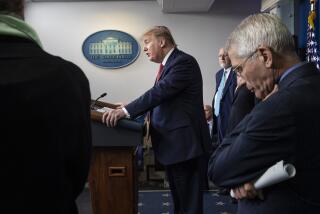Rep. Peter King’s hearing on American Muslims a ‘very personal’ quest
- Share via
Reporting from Washington and New York — For Rep. Peter T. King, Sept. 11 was personal. It was personal, he says, for everyone in his Long Island district, which was home to dozens of the police, firefighters and financial workers who died at the World Trade Center.
And despite concerted nationwide criticism of the Republican’s plan to hold a House Homeland Security Committee hearing Thursday on radicalization in the U.S. Muslim community, King says in his district he has nearly universal support.
“Everyone is telling me to go ahead with it,” King said in an interview, adding that he thinks his district is a good place to measure public opinion in the U.S. on such issues. “My district, I think it is a good barometer. Nobody in my district didn’t know somebody who was killed on Sept. 11. It is still very personal.”
Critics have questioned King for his approach to a hearing that some argue goes too far, lumping in all Muslim Americans with the religious extremists who would do harm to America. The hearing, critics argue, will do nothing to stem domestic terrorism and may in fact hurt King’s cause by further alienating the very community that law enforcement agencies rely on to prevent attacks.
“To the extent that these hearings make American Muslims feel that they are the object of fear-mongering, it will only serve Al Qaeda’s ends,” said Richard Clarke, a counter-terrorism advisor to Presidents Clinton and George W. Bush.
In holding the hearing, King wants to highlight what he sees as an unwillingness by Muslim leaders to aggressively prevent radicalization of young men and engage in robust cooperation with law enforcement to prevent attacks. Two family members of young American men seduced by Islamic extremism are expected to testify to their frustrations at the lack of assistance they received from local religious leaders to counteract their loved ones’ radicalization.
But research by two North Carolina universities shows Muslims have been the top source of tips that have thwarted terrorism plots in the U.S. King’s critics say the hearing is unlikely to yield revelations or investigative breakthroughs, and will only serve to promote anti-Muslim sentiment in the United States.
King counters that Obama administration officials have made the same observations he has about the rise in home-grown plots hatched in the name of Islam, even if he has been less careful in his choice of words.
Deputy national security advisor Denis McDonough, for example, told a Virginia-based Muslim community group this week that old assumptions that our unique melting pot made the U.S. immune to Al Qaeda’s attempts to radicalize people here “was false hope, and false comfort.”
But administration officials have made a point of presenting the American Muslim community as part of the solution, not the problem.
“The most effective voices against Al Qaeda’s warped worldview and interpretation of Islam are other Muslims,” McDonough said Sunday. He also met Wednesday at the White House with Muslim activists and community leaders in advance of King’s hearing to assure them that the administration doesn’t view American Muslims as a threat.
A report from Duke University and the University of North Carolina released last month examined terrorism investigations since Sept. 11, 2001, and found that fellow Muslims provided useful tips that helped arrest 48 of 120 Muslims suspected of plotting attacks in the U.S.
Singling out one religious community for scrutiny “is the heart of scapegoating,” said Rep. Keith Ellison (D-Minn.), who is Muslim and believes it important that he testify at Thursday’s hearing, even though he disagrees with King’s approach.
“This hearing is not going to help. Will it hurt? I hope not. Will it help? Definitely not. … We need a greater level of engagement and more trust, and these hearings do the opposite,” Ellison said.
King has never been one to shy away from controversy, and that has boosted his popularity his blue-collar district. He hasn’t had a close race since he was first elected in 1992. In November, King won his 10th term in Congress with 72% of the vote, his highest percentage.
“He has a strong streak of independence,” said Mike Long, the influential head of the New York State Conservative Party who has locked horns with King, but considers him an ethical and fair public advocate. King angered a lot of conservatives in New York when he voted to oppose Clinton’s impeachment in 1998.
He was a visible supporter of the Irish Republican Army, which his critics have pointed out engaged in terrorist activity. He spoke in favor of the struggle against “British imperialism” at a pro-IRA rally on Long Island in 1982. King has said that the IRA never targeted Americans and his loyalty is with the U.S.
Some who have followed him for a long time saw a shift in King’s attitude after Sept. 11, when he took a hard line on illegal immigration and Islamic terrorism. “I’ve detected a change,” said Niall O’Dowd, founder of the Irish Central, the largest Irish American news website, who has known King for more than 25 years. “I think he’s gone off the rails.”
Like many middle-class families, King moved to Long Island from New York City for the safety and space of the suburbs. What happened on Sept. 11 shattered that sense of security those communities had come to hold dear, said Brendan Quinn, a former New York Republican Party executive who grew up in Long Island’s Nassau County and has known King for decades.
“In the rest of the state, in the rest of the country, you just don’t understand, you don’t have the same connection to what happened on Sept. 11,” said Quinn, who saw King at funeral after funeral in the days after the twin towers fell.
Bennett reported from Washington and Baum from New York.
More to Read
Sign up for Essential California
The most important California stories and recommendations in your inbox every morning.
You may occasionally receive promotional content from the Los Angeles Times.











